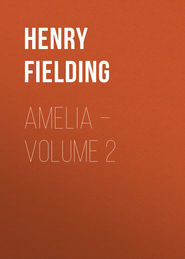По всем вопросам обращайтесь на: info@litportal.ru
(©) 2003-2024.
✖
The Works of Henry Fielding, vol. 11
Настройки чтения
Размер шрифта
Высота строк
Поля
How different was the case with us! we carried our provision, our kitchen, and our cook with us, and we were at one and the same time travelling on our road, and sitting down to a repast of fish, with which the greatest table in London can scarce at any rate be supplied.
Friday.– As we were disappointed of our wind, and obliged to return back the preceding evening, we resolved to extract all the good we could out of our misfortune, and to add considerably to our fresh stores of meat and bread, with which we were very indifferently provided when we hurried away yesterday. By the captain’s advice we likewise laid in some stores of butter, which we salted and potted ourselves, for our use at Lisbon, and we had great reason afterwards to thank him for his advice.
In the afternoon I persuaded my wife, whom it was no easy matter for me to force from my side, to take a walk on shore, whither the gallant captain declared he was ready to attend her. Accordingly the ladies set out, and left me to enjoy a sweet and comfortable nap after the operation of the preceding day.
Thus we enjoyed our separate pleasures full three hours, when we met again, and my wife gave the foregoing account of the gentleman whom I have before compared to Axylus, and of his habitation, to both which she had been introduced by the captain, in the stile of an old friend and acquaintance, though this foundation of intimacy seemed to her to be no deeper laid than in an accidental dinner, eaten many years before, at this temple of hospitality, when the captain lay wind-bound in the same bay.
Saturday.– Early this morning the wind seemed inclined to change in our favour. Our alert captain snatched its very first motion, and got under sail with so very gentle a breeze that, as the tide was against him, he recommended to a fishing hoy to bring after him a vast salmon and some other provisions which lay ready for him on shore.
Our anchor was up at six, and before nine in the morning we had doubled the Berry-head, and were arrived off Dartmouth, having gone full three miles in as many hours, in direct opposition to the tide, which only befriended us out of our harbour; and though the wind was perhaps our friend, it was so very silent, and exerted itself so little in our favour, that, like some cool partisans, it was difficult to say whether it was with us or against us. The captain, however, declared the former to be the case during the whole three hours; but at last he perceived his error, or rather, perhaps, this friend, which had hitherto wavered in chusing his side, became now more determined. The captain then suddenly tacked about, and, asserting that he was bewitched, submitted to return to the place from whence he came. Now, though I am as free from superstition as any man breathing, and never did believe in witches, notwithstanding all the excellent arguments of my lord chief-justice Hale in their favour, and long before they were put down by act of parliament, yet by what power a ship of burthen should sail three miles against both wind and tide, I cannot conceive, unless there was some supernatural interposition in the case; nay, could we admit that the wind stood neuter, the difficulty would still remain. So that we must of necessity conclude that the ship was either bewinded or bewitched.
The captain, perhaps, had another meaning. He imagined himself, I believe, bewitched, because the wind, instead of persevering in its change in his favour, for change it certainly did that morning, should suddenly return to its favourite station, and blow him back towards the bay. But, if this was his opinion, he soon saw cause to alter; for he had not measured half the way back when the wind again declared in his favour, and so loudly, that there was no possibility of being mistaken.
The orders for the second tack were given, and obeyed with much more alacrity than those had been for the first. We were all of us indeed in high spirits on the occasion; though some of us a little regretted the good things we were likely to leave behind us by the fisherman’s neglect; I might give it a worse name, for he faithfully promised to execute the commission, which he had had abundant opportunity to do; but nautica fides deserves as much to be proverbial as ever Punica fides could formerly have done. Nay, when we consider that the Carthaginians came from the Phenicians, who are supposed to have produced the first mariners, we may probably see the true reason of the adage, and it may open a field of very curious discoveries to the antiquarian.
We were, however, too eager to pursue our voyage to suffer anything we left behind us to interrupt our happiness, which, indeed, many agreeable circumstances conspired to advance. The weather was inexpressibly pleasant, and we were all seated on the deck, when our canvas began to swell with the wind. We had likewise in our view above thirty other sail around us, all in the same situation. Here an observation occurred to me, which, perhaps, though extremely obvious, did not offer itself to every individual in our little fleet: when I perceived with what different success we proceeded under the influence of a superior power, which, while we lay almost idle ourselves, pushed us forward on our intended voyage, and compared this with the slow progress which we had made in the morning, of ourselves, and without any such assistance, I could not help reflecting how often the greatest abilities lie wind-bound as it were in life; or, if they venture out and attempt to beat the seas, they struggle in vain against wind and tide, and, if they have not sufficient prudence to put back, are most probably cast away on the rocks and quicksands which are every day ready to devour them.
It was now our fortune to set out melioribus avibus. The wind freshened so briskly in our poop that the shore appeared to move from us as fast as we did from the shore. The captain declared he was sure of a wind, meaning its continuance; but he had disappointed us so often that he had lost all credit. However, he kept his word a little better now, and we lost sight of our native land as joyfully, at least, as it is usual to regain it.
Sunday.– The next morning the captain told me he thought himself thirty miles to the westward of Plymouth, and before evening declared that the Lizard Point, which is the extremity of Cornwall, bore several leagues to leeward. Nothing remarkable passed this day, except the captain’s devotion, who, in his own phrase, summoned all hands to prayers, which were read by a common sailor upon deck, with more devout force and address than they are commonly read by a country curate, and received with more decency and attention by the sailors than are usually preserved in city congregations. I am indeed assured, that if any such affected disregard of the solemn office in which they were engaged, as I have seen practised by fine gentlemen and ladies, expressing a kind of apprehension lest they should be suspected of being really in earnest in their devotion, had been shewn here, they would have contracted the contempt of the whole audience. To say the truth, from what I observed in the behaviour of the sailors in this voyage, and on comparing it with what I have formerly seen of them at sea and on shore, I am convinced that on land there is nothing more idle and dissolute; in their own element there are no persons near the level of their degree who live in the constant practice of half so many good qualities. They are, for much the greater part, perfect masters of their business, and always extremely alert, and ready in executing it, without any regard to fatigue or hazard. The soldiers themselves are not better disciplined nor more obedient to orders than these whilst aboard; they submit to every difficulty which attends their calling with chearfulness, and no less virtues and patience and fortitude are exercised by them every day of their lives.
All these good qualities, however, they always leave behind them on shipboard; the sailor out of water is, indeed, as wretched an animal as the fish out of water; for though the former hath, in common with amphibious animals, the bare power of existing on the land, yet if he be kept there any time he never fails to become a nuisance.
The ship having had a good deal of motion since she was last under sail, our women returned to their sickness, and I to my solitude; having, for twenty-four hours together, scarce opened my lips to a single person. This circumstance of being shut up within the circumference of a few yards, with a score of human creatures, with not one of whom it was possible to converse, was perhaps so rare as scarce ever to have happened before, nor could it ever happen to one who disliked it more than myself, or to myself at a season when I wanted more food for my social disposition, or could converse less wholesomely and happily with my own thoughts. To this accident, which fortune opened to me in the Downs, was owing the first serious thought which I ever entertained of enrolling myself among the voyage-writers; some of the most amusing pages, if, indeed, there be any which deserve that name, were possibly the production of the most disagreeable hours which ever haunted the author.
Monday.– At noon the captain took an observation, by which it appeared that Ushant bore some leagues northward of us, and that we were just entering the bay of Biscay. We had advanced a very few miles in this bay before we were entirely becalmed: we furled our sails, as being of no use to us while we lay in this most disagreeable situation, more detested by the sailors than the most violent tempest: we were alarmed with the loss of a fine piece of salt beef, which had been hung in the sea to freshen it; this being, it seems, the strange property of salt-water. The thief was immediately suspected, and presently afterwards taken by the sailors. He was, indeed, no other than a huge shark, who, not knowing when he was well off, swallowed another piece of beef, together with a great iron crook on which it was hung, and by which he was dragged into the ship.
I should scarce have mentioned the catching this shark, though so exactly conformable to the rules and practice of voyage-writing, had it not been for a strange circumstance that attended it. This was the recovery of the stolen beef out of the shark’s maw, where it lay unchewed and undigested, and whence, being conveyed into the pot, the flesh, and the thief that had stolen it, joined together in furnishing variety to the ship’s crew.
During this calm we likewise found the mast of a large vessel, which the captain thought had lain at least three years in the sea. It was stuck all over with a little shell-fish or reptile, called a barnacle, and which probably are the prey of the rock-fish, as our captain calls it, asserting that it is the finest fish in the world; for which we are obliged to confide entirely to his taste; for, though he struck the fish with a kind of harping-iron, and wounded him, I am convinced, to death, yet he could not possess himself of his body; but the poor wretch escaped to linger out a few hours with probably great torments.
In the evening our wind returned, and so briskly, that we ran upwards of twenty leagues before the next day’s [Tuesday’s] observation, which brought us to lat. 47° 42´. The captain promised us a very speedy passage through the bay; but he deceived us, or the wind deceived him, for it so slackened at sunset, that it scarce carried us a mile in an hour during the whole succeeding night.
Wednesday.– A gale struck up a little after sun-rising, which carried us between three and four knots or miles an hour. We were this day at noon about the middle of the bay of Biscay, when the wind once more deserted us, and we were so entirely becalmed, that we did not advance a mile in many hours. My fresh-water reader will perhaps conceive no unpleasant idea from this calm; but it affected us much more than a storm could have done; for, as the irascible passions of men are apt to swell with indignation long after the injury which first raised them is over, so fared it with the sea. It rose mountains high, and lifted our poor ship up and down, backwards and forwards, with so violent an emotion, that there was scarce a man in the ship better able to stand than myself. Every utensil in our cabin rolled up and down, as we should have rolled ourselves, had not our chairs been fast lashed to the floor. In this situation, with our tables likewise fastened by ropes, the captain and myself took our meal with some difficulty, and swallowed a little of our broth, for we spilt much the greater part. The remainder of our dinner being an old, lean, tame duck roasted, I regretted but little the loss of, my teeth not being good enough to have chewed it.
Our women, who began to creep out of their holes in the morning, retired again within the cabin to their beds, and were no more heard of this day, in which my whole comfort was to find by the captain’s relation that the swelling was sometimes much worse; he did, indeed, take this occasion to be more communicative than ever, and informed me of such misadventures that had befallen him within forty-six years at sea as might frighten a very bold spirit from undertaking even the shortest voyage. Were these, indeed, but universally known, our matrons of quality would possibly be deterred from venturing their tender offspring at sea; by which means our navy would lose the honour of many a young commodore, who at twenty-two is better versed in maritime affairs than real seamen are made by experience at sixty.
And this may, perhaps, appear the more extraordinary, as the education of both seems to be pretty much the same; neither of them having had their courage tried by Virgil’s description of a storm, in which, inspired as he was, I doubt whether our captain doth not exceed him.
In the evening the wind, which continued in the N.W., again freshened, and that so briskly that Cape Finisterre appeared by this day’s observation to bear a few miles to the southward. We now indeed sailed, or rather flew, near ten knots an hour; and the captain, in the redundancy of his good-humour, declared he would go to church at Lisbon on Sunday next, for that he was sure of a wind; and, indeed, we all firmly believed him. But the event again contradicted him; for we were again visited by a calm in the evening.
But here, though our voyage was retarded, we were entertained with a scene, which as no one can behold without going to sea, so no one can form an idea of anything equal to it on shore. We were seated on the deck, women and all, in the serenest evening that can be imagined. Not a single cloud presented itself to our view, and the sun himself was the only object which engrossed our whole attention. He did indeed set with a majesty which is incapable of description, with which, while the horizon was yet blazing with glory, our eyes were called off to the opposite part to survey the moon, which was then at full, and which in rising presented us with the second object that this world hath offered to our vision. Compared to these the pageantry of theatres, or splendour of courts, are sights almost below the regard of children.
We did not return from the deck till late in the evening; the weather being inexpressibly pleasant, and so warm that even my old distemper perceived the alteration of the climate. There was indeed a swell, but nothing comparable to what we had felt before, and it affected us on the deck much less than in the cabin.
Friday.– The calm continued till sun-rising, when the wind likewise arose, but unluckily for us it came from a wrong quarter; it was S.S.E., which is that very wind which Juno would have solicited of Æolus, had Æneas been in our latitude bound for Lisbon.
The captain now put on his most melancholy aspect, and resumed his former opinion that he was bewitched. He declared with great solemnity that this was worse and worse, for that a wind directly in his teeth was worse than no wind at all. Had we pursued the course which the wind persuaded us to take we had gone directly for Newfoundland, if we had not fallen in with Ireland in our way. Two ways remained to avoid this; one was to put into a port of Galicia; the other, to beat to the westward with as little sail as possible: and this was our captain’s election.
As for us, poor passengers, any port would have been welcome to us; especially, as not only our fresh provisions, except a great number of old ducks and fowls, but even our bread was come to an end, and nothing but sea-biscuit remained, which I could not chew. So that now for the first time in my life I saw what it was to want a bit of bread.
The wind however was not so unkind as we had apprehended; but, having declined with the sun, it changed at the approach of the moon, and became again favourable to us, though so gentle that the next day’s observation carried us very little to the southward of Cape Finisterre. This evening at six the wind, which had been very quiet all day, rose very high, and continuing in our favour drove us seven knots an hour.
This day we saw a sail, the only one, as I heard of, we had seen in our whole passage through the bay. I mention this on account of what appeared to me somewhat extraordinary. Though she was at such a distance that I could only perceive she was a ship, the sailors discovered that she was a snow, bound to a port in Galicia.
Sunday.– After prayers, which our good captain read on the deck with an audible voice, and with but one mistake, of a lion for Elias, in the second lesson for this day, we found ourselves far advanced in 42°, and the captain declared we should sup off Porte. We had not much wind this day; but, as this was directly in our favour, we made it up with sail, of which we crowded all we had. We went only at the rate of four miles an hour, but with so uneasy a motion, continually rolling from side to side, that I suffered more than I had done in our whole voyage; my bowels being almost twisted out of my belly. However, the day was very serene and bright, and the captain, who was in high spirits, affirmed he had never passed a pleasanter at sea.
The wind continued so brisk that we ran upward of six knots an hour the whole night.
Monday.– In the morning our captain concluded that he was got into lat. 40°, and was very little short of the Burlings, as they are called in the charts. We came up with them at five in the afternoon, being the first land we had distinctly seen since we left Devonshire. They consist of abundance of little rocky islands, a little distant from the shore, three of them only shewing themselves above the water.
Here the Portuguese maintain a kind of garrison, if we may allow it that name. It consists of malefactors, who are banished hither for a term, for divers small offences – a policy which they may have copied from the Egyptians, as we may read in Diodorus Siculus. That wise people, to prevent the corruption of good manners by evil communication, built a town on the Red Sea, whither they transported a great number of their criminals, having first set an indelible mark on them, to prevent their returning and mixing with the sober part of their citizens.
These rocks lie about fifteen leagues north-west of Cape Roxent, or, as it is commonly called, the Rock of Lisbon, which we past early the next morning. The wind, indeed, would have carried us thither sooner; but the captain was not in a hurry, as he was to lose nothing by his delay.
Tuesday.– This is a very high mountain, situated on the northern side of the mouth of the river Tajo, which, rising about Madrid, in Spain, and soon becoming navigable for small craft, empties itself, after a long course, into the sea, about four leagues below Lisbon.
On the summit of the rock stands a hermitage, which is now in the possession of an Englishman, who was formerly master of a vessel trading to Lisbon; and, having changed his religion and his manners, the latter of which, at least, were none of the best, betook himself to this place, in order to do penance for his sins. He is now very old, and hath inhabited this hermitage for a great number of years, during which he hath received some countenance from the royal family, and particularly from the present queen dowager, whose piety refuses no trouble or expence by which she may make a proselyte, being used to say that the saving one soul would repay all the endeavours of her life.
Here we waited for the tide, and had the pleasure of surveying the face of the country, the soil of which, at this season, exactly resembles an old brick-kill, or a field where the green sward is pared up and set a burning, or rather a smoaking, in little heaps to manure the land. This sight will, perhaps, of all others, make an Englishman proud of, and pleased with, his own country, which in verdure excels, I believe, every other country. Another deficiency here is the want of large trees, nothing above a shrub being here to be discovered in the circumference of many miles.
At this place we took a pilot on board, who, being the first Portuguese we spoke to, gave us an instance of that religious observance which is paid by all nations to their laws; for, whereas it is here a capital offence to assist any person in going on shore from a foreign vessel before it hath been examined, and every person in it viewed by the magistrates of health, as they are called, this worthy pilot, for a very small reward, rowed the Portuguese priest to shore at this place, beyond which he did not dare to advance, and in venturing whither he had given sufficient testimony of love for his native country.
We did not enter the Tajo till noon, when, after passing several old castles and other buildings which had greatly the aspect of ruins, we came to the castle of Bellisle, where we had a full prospect of Lisbon, and were, indeed, within three miles of it.
Here we were saluted with a gun, which was a signal to pass no farther till we had complied with certain ceremonies which the laws of this country require to be observed by all ships which arrive in this port. We were obliged then to cast anchor, and expect the arrival of the officers of the customs, without whose passport no ship must proceed farther than this place.
Here likewise we received a visit from one of those magistrates of health before mentioned. He refused to come on board the ship till every person in her had been drawn up on deck and personally viewed by him. This occasioned some delay on my part, as it was not the work of a minute to lift me from the cabin to the deck. The captain thought my particular case might have been excused from this ceremony, and that it would be abundantly sufficient if the magistrate, who was obliged afterwards to visit the cabin, surveyed me there. But this did not satisfy the magistrate’s strict regard to his duty. When he was told of my lameness, he called out, with a voice of authority, “Let him be brought up,” and his orders were presently complied with. He was, indeed, a person of great dignity, as well as of the most exact fidelity in the discharge of his trust. Both which are the more admirable as his salary is less than thirty pounds English per annum.
Before a ship hath been visited by one of those magistrates no person can lawfully go on board her, nor can any on board depart from her. This I saw exemplified in a remarkable instance. The young lad whom I have mentioned as one of our passengers was here met by his father, who, on the first news of the captain’s arrival, came from Lisbon to Bellisle in a boat, being eager to embrace a son whom he had not seen for many years. But when he came alongside our ship neither did the father dare ascend nor the son descend, as the magistrate of health had not yet been on board.
Some of our readers will, perhaps, admire the great caution of this policy, so nicely calculated for the preservation of this country from all pestilential distempers. Others will as probably regard it as too exact and formal to be constantly persisted in, in seasons of the utmost safety, as well as in times of danger. I will not decide either way, but will content myself with observing that I never yet saw or heard of a place where a traveller had so much trouble given him at his landing as here. The only use of which, as all such matters begin and end in form only, is to put it into the power of low and mean fellows to be either rudely officious or grossly corrupt, as they shall see occasion to prefer the gratification of their pride or of their avarice.
Of this kind, likewise, is that power which is lodged with other officers here, of taking away every grain of snuff and every leaf of tobacco brought hither from other countries, though only for the temporary use of the person during his residence here. This is executed with great insolence, and, as it is in the hands of the dregs of the people, very scandalously; for, under pretence of searching for tobacco and snuff, they are sure to steal whatever they can find, insomuch that when they came on board our sailors addressed us in the Covent-garden language: “Pray, gentlemen and ladies, take care of your swords and watches.” Indeed, I never yet saw anything equal to the contempt and hatred which our honest tars every moment expressed for these Portuguese officers.
At Bellisle lies buried Catharine of Arragon, widow of prince Arthur, eldest son of our Henry VII., afterwards married to, and divorced from, Henry VIII. Close by the church where her remains are deposited is a large convent of Geronymites, one of the most beautiful piles of building in all Portugal.
In the evening, at twelve, our ship, having received previous visits from all the necessary parties, took the advantage of the tide, and having sailed up to Lisbon cast anchor there, in a calm and moonshiny night, which made the passage incredibly pleasant to the women, who remained three hours enjoying it, whilst I was left to the cooler transports of enjoying their pleasures at second-hand; and yet, cooler as they may be, whoever is totally ignorant of such sensation is, at the same time, void of all ideas of friendship.
Wednesday.– Lisbon, before which we now lay at anchor, is said to be built on the same number of hills with old Rome; but these do not all appear to the water; on the contrary, one sees from thence one vast high hill and rock, with buildings arising above one another, and that in so steep and almost perpendicular a manner, that they all seem to have but one foundation.
As the houses, convents, churches, &c., are large, and all built with white stone, they look very beautiful at a distance; but as you approach nearer, and find them to want every kind of ornament, all idea of beauty vanishes at once. While I was surveying the prospect of this city, which bears so little resemblance to any other that I have ever seen, a reflexion occurred to me that, if a man was suddenly to be removed from Palmyra hither, and should take a view of no other city, in how glorious a light would the antient architecture appear to him! and what desolation and destruction of arts and sciences would he conclude had happened between the several æras of these cities!
I had now waited full three hours upon deck for the return of my man, whom I had sent to bespeak a good dinner (a thing which had been long unknown to me) on shore, and then to bring a Lisbon chaise with him to the sea-shore; but it seems the impertinence of the providore was not yet brought to a conclusion. At three o’clock, when I was, from emptiness, rather faint than hungry, my man returned, and told me there was a new law lately made that no passenger should set his foot on shore without a special order from the providore, and that he himself would have been sent to prison for disobeying it, had he not been protected as the servant of the captain. He informed me likewise that the captain had been very industrious to get this order, but that it was then the providore’s hour of sleep, a time when no man, except the king himself, durst disturb him.
To avoid prolixity, though in a part of my narrative which may be more agreeable to my reader than it was to me, the providore, having at last finished his nap, dispatched this absurd matter of form, and gave me leave to come, or rather to be carried, on shore.
What it was that gave the first hint of this strange law is not easy to guess. Possibly, in the infancy of their defection, and before their government could be well established, they were willing to guard against the bare possibility of surprise, of the success of which bare possibility the Trojan horse will remain for ever on record, as a great and memorable example. Now the Portuguese have no walls to secure them, and a vessel of two or three hundred tons will contain a much larger body of troops than could be concealed in that famous machine, though Virgil tells us (somewhat hyperbolically, I believe) that it was as big as a mountain.












